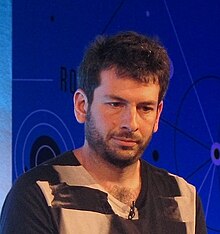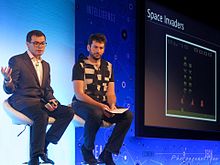| Blaise Agüera y Arcas | |
|---|---|
 Blaise Agüera y Arcas in 2014 Blaise Agüera y Arcas in 2014 | |
| Born | 1975 (age 48–49) Providence, Rhode Island |
| Alma mater | Princeton University |
| Occupation(s) | AI researcher, software engineer, author |
| Employer | |
Blaise Agüera y Arcas (born 1975) is an American artificial intelligence (AI) researcher, software engineer, software architect, and author.
He is vice president and fellow at Google Research, where he leads a team that conducts basic research in AI and builds AI-based products and technologies. He also founded the Artists and Machine Intelligence program at Google, which creates art by pairing machine intelligence engineers with artists. Before he joined Google in 2013, Agüera y Arcas was an engineer at Microsoft and the architect of Bing Maps and Bing Mobile.
Agüera y Arcas has published scientific articles, essays, op-eds, and the books Ubi Sunt in 2022 and Who Are We Now? in 2023. He appears regularly at TED.
Early life and education
Blaise Agüera y Arcas was born in Providence, Rhode Island to a Spanish father and an American mother. He grew up in Mexico City. As a teenager, Agüera y Arcas interned with the U.S. Navy research center in Bethesda, Maryland, where he reprogrammed the guidance software for aircraft carriers to improve their stability at sea, which helped to reduce seasickness among sailors. In 1998 Agüera y Arcas graduated from Princeton University where he received a B.A. in physics.
Career
In 2001, using computational techniques, Agüera y Arcas and Princeton University’s Scheide Librarian Paul Needham published their findings that the punchcutting method for mass-producing movable type attributed to Johannes Gutenberg was likely invented decades after Gutenberg’s Bible, and by a different inventor.
Seadragon
Main article: Seadragon SoftwareIn 2003, Agüera y Arcas founded Sand Codex, later renamed Seadragon Software. He moved to Seattle in 2004 to accommodate his wife's new role at the University of Washington. In 2004, he devised a computational method for the Library of Congress to create color composite images of almost two thousand negatives by Sergey Prokudin-Gorsky.
Microsoft
In 2006, Agüera y Arcas sold Seadragon to Microsoft Live Labs. The technology was used to develop Silverlight, Pivot, Photosynth and the standalone cross-platform Seadragon application for iPhone and iPad. Slate called Photosynth "the best thing to happen to digital photography since the digital camera".
At Microsoft, Agüera y Arcas was the architect leading Bing Maps and Bing Mobile and was named a Distinguished Engineer in 2011. He collaborated with Ricoh to make the Theta, a 360º camera whose captured content displayed in Photosynth.
While at Microsoft, Agüera y Arcas suggested that technology should be designed for women. He cited a gap between the extent to which technology is designed for women and the market opportunity women represent, given trends in graduation rates and earnings.

In 2013, Agüera y Arcas left Microsoft to lead a new machine intelligence effort at Google, along with programs in computer vision and computational photography. His departure from Microsoft for Google generated a press cycle, with articles appearing in publications that included The New York Times, Fast Company, International Business Times, and ValueWalk.
As of 2016, he was working on projects that add deep learning to mobile devices. He founded the Artists and Machine Intelligence program, which fuses machine intelligence and art. The program's first public exhibit was on February 26, 2016 at the Gray Area, where Agüera y Arcas was the keynote speaker. On June 1, 2016, the program held the MAMI (Music, Art, and Machine Intelligence) show.
In 2021, Agüera y Arcas published an opinion on his experience with the latest generation large language models in the form of AI chatbot LaMDA stating that "no objective answer is possible to the question of when an 'it' becomes a 'who'."
Publications
Books
- Ubi Sunt (Hat & Beard Press, Oct. 25, 2022) ISBN 978-1-95-512513-0
- Who Are We Now? (Hat & Beard Press, Dec. 19, 2023) ISBN 978-1-95-512530-7
TED Talks
| Date | Title | Comments |
|---|---|---|
| 5/2007 | How PhotoSynth Can Connect the World's Images | Demonstrates Seadragon's zooming technology and Photosynth's ability to create 3D models from user photos. Named one of Bill Gates's "13 favorite talks". |
| 2/2010 | Augmented Reality Maps | Live demo of live video in Bing Maps. |
| 5/2016 | How Computers are Learning to be Creative | How computers can be used to generate images; refers to DeepDream. |
Honors & Awards
In 2008, Agüera y Arcas was named one of MIT Technology Review's Innovators Under 35 TR35.
Fast Company has named Agüera y Arcas one of the "Most Creative People in Business" in 2009 and in 2014.
In 2022, Agüera y Arcas’ book, Ubi Sunt, won AIGA’s 50 Books | 50 Covers award.
References
- ^ Mick, Jason (December 17, 2013). "Top Microsoft Graphics Genius Defects to Google". DailyTech. Archived from the original on December 18, 2013.
Blaise Agüera y Arcas, 38, … born in Mexico City, Mexico in 1975
- ^ Wingfield, Nick (2010-11-06). "Taking on Google by Learning From Ants". Wall Street Journal. ISSN 0099-9660. Retrieved 2016-08-24.
- ^ "Blaise Aguera y Arcas – Google Research". Google Research. Retrieved 2023-08-17.
- "Artists and Machine Intelligence". ami.withgoogle.com. Retrieved 2023-02-28.
- Arcas, Blaise Aguera y (2016-02-23). "Art in the Age of Machine Intelligence". Medium. Retrieved 2016-08-24.
- ^ "The skinny on Bing's new panorama maker (video)". CNET. Retrieved 2024-09-23.
- "Blaise Aguera y Arcas". scholar.google.com. Retrieved 2023-08-17.
- "Ubi Sunt by Blaise Agüera y Arcas". Hat & Beard Press. Retrieved 2024-09-22.
- "Who Are We Now? by Blaise Agüera y Arcas". Hat & Beard Press. Retrieved 2024-09-22.
- Arcas, Blaise Agüera y. "Blaise Agüera y Arcas | Speaker | TED.com". Retrieved 2016-08-24.
- "Blaise Aguera y Arcas - Aspects of Machine Learning".
- Smith, Dinitia (2001-01-27). "Has History Been Too Generous to Gutenberg?". The New York Times. ISSN 0362-4331. Retrieved 2016-08-24.
- "What Did Gutenberg Invent?". Retrieved 2016-08-24.
- Christie, Alix (2014-12-04). "Was Gutenberg really the original tech disrupter?". Financial Times. ISSN 0307-1766. Retrieved 2016-08-24.
- ^ "Microsoft acquiring Seadragon Software". The Seattle Times. January 28, 2006. Archived from the original on 2006-05-25.
- "Prokudin-Gorskii Collection – Digitizing the Collection – Prints & Photographs Online Catalog". Library of Congress. 1905.
- "The Seattle Times: Microsoft: Microsoft acquiring Seadragon Software". old.seattletimes.com. Retrieved 2016-08-24.
- Manjoo, Farhad (2009-01-27). "All I Wanna Do Is Zoom Zoom Zoom Zoom". Slate. ISSN 1091-2339. Retrieved 2016-08-24.
- "Bing Introduces 3-D Photosynth Maps". Fast Company. December 2, 2009.
- "Ricoh Theta WiFi camera shoots 360-degree photos for $399 (hands-on)". Engadget. Retrieved 2016-08-24.
- "Every Tech Firm Should Be Trying To Please Women, Microsoft Researcher Says". Business Insider. Retrieved 2016-08-24.
- "DailyTech - Top Microsoft Graphics Genius Defects to Google". 2013-12-18. Archived from the original on 2013-12-18. Retrieved 2023-08-17.
- Wingfield, Nick (2013-12-16). "A Microsoft Star Goes to Google". Retrieved 2023-02-28.
- "Can Blaise Agüera y Arcas End Google Maps' Arms Race With Apple And Microsoft?". Fast Company. 2013-12-16.
- "Google Poaches Top Microsoft Engineer". International Business Times. 2013-12-16. Retrieved 2023-02-28.
- Jones, Michelle (2013-12-16). "Microsoft Corporation (MSFT) Loses Out On Top CEO Candidates". ValueWalk. Retrieved 2023-02-28.
- "How Google Is Trying to Build a Smarter Smartphone". Fortune. 2016-01-28. Retrieved 2016-08-24.
- "Artists + Machine Intelligence – Medium". Medium. Retrieved 2023-02-28.
- "Art and Machine Learning Symposium". Gray Area. Retrieved 2016-08-24.
- McDowell, Kenric (2016-06-28). "Music, Art & Machine Intelligence 2016 Conference Proceedings". Medium. Retrieved 2016-08-24.
- Arcas, Blaise Aguera y (2021-12-06). "Do large language models understand us?". Medium. Retrieved 2023-02-28.
- Agüera y Arcas, Blaise (March 2007). "How PhotoSynth can connect the world's images". TED.
- "Bill Gates: My 13 favorite talks". TED. Retrieved 2024-09-23.
- Agüera y Arcas, Blaise (February 2010). "Augmented-reality maps". TED.
- Agüera y Arcas, Blaise (May 2016). "How computers are learning to be creative". TED.
- "2008 Young Innovators Under 35". Technology Review. 2008. Retrieved August 15, 2011.
- "Most Creative People 2009". Fast Company. May 8, 2009. Archived from the original on 2015-02-23.
- "Most Creative People In Business 1000: The Complete List". Fast Company. January 29, 2014. Archived from the original on 2015-02-22.
- "AIGA - Ubi Sunt". 50books50covers.secure-platform.com. Retrieved 2023-08-17.
External links
- Reconstructing Prokudin-Gorskii's Color Photography in Software, 2004
- Newsweek profile, 2008
- TR35 profile, 2008
- @blaiseaguera Twitter account
- Blaise Agüera y Arcas at Medium Blogs 2016-2022
- Style is Violence blog
- Blaise Agüera y Arcas at Google
- Library of Congress Name Authority File entry
- Virtual International Authority File entry
- Blaise Agüera y Arcas at TED
